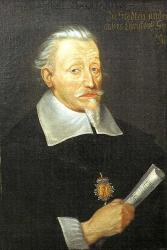Planning worship?
Check out our sister site, ZeteoSearch.org,
for 20+ additional resources related to your search.
- |
User Links
Person Results
Heinrich Schütz

1585 - 1672 Composer of "[Wohl denen, die da wandeln]" in Antwort Finden in alten und neuen Liedern, in Worten zum Nachdenken und Beten Heinrich Schütz (baptized Oct. 9, 1585-1672) was the greatest German composer of the seventeenth century and the first to reach international prominence. His influence was felt for more than two centuries after his death.
In 1598, after hearing the young Henrich sing, the Landgrave Moritz of Hessen-Kassel began a campaign to have the boy study at Kassel. In 1599, Christoph Schütz took his son to the landgrave’s seat, where he served as a choirboy and pursued his education showing particular facility in Greek, Latin, and Frence. After he lost his treble voice, he set out for the University of Marburg, where he studied law. But under the sponsorship of the landgrave, Heinrich went to Venice (1609) and studied with Giovanni Gabrieli until Gabrieli’s death in 1612. In 1613 he returned to Germany, once again studying law while serving as organist to the landgrave. He was lent to Johann Georg I of Saxony (1614) and subsequently became director of the chapel, a position he held the rest of his life. The untimely death of his wife after six years of marriage (1625) led him to devote himself to the composition of church music. After several petitions Schütz was granted leave to study with Claudio Monteverdi and once again set out for Venice. For much of his life the Thirty Years’ War obstructed his work, and he spent time moving from court to court in Europe, finally settling in Dresden in 1641, where he died.
--The Presbyterian Hymnal Companion, 1993
Heinrich Schütz
Cornelius Becker
1561 - 1604 Author of "Wohl denen, die da wandeln" in Antwort Finden in alten und neuen Liedern, in Worten zum Nachdenken und Beten Becker, Cornelius, son of Adrian Becker, merchant of Leipzig, was born at Leipzig, Oct. 24, 1561. After studying at the University, where he graduated 1584, he kept a private school till his appointment, in the beginning of 1588, as one of the masters of the St. Thomas School, a post he vacated in Sept., 1588. on being appointed diaconus at Rochlitz. In 1592 he became diaconus, and in 1594, pastor of the church of St. Nicholas, Leipzig; and subsequently Professor of Theology in the University, from which, in 1599, he received the degree of D.D. On account of false accusations he was deprived of his charge on June 5, 1601, but was vindicated and restored on Nov. 29 following. He died suddenly at Leipzig, May 25, 1604 (Koch, ii. 219-223; Allgemeine Deutsche Biographie, ii. 221). He wrote a few hymns, but his principal work was his version of the Psalter, 1602. The only version translated into English is:—
Der Herr ist mein getreuer Hirt, Dem ich mich ganz vertraue. [Ps. xxiii.] Appeared in S. Calvidus's Harmonia Cantionum Ecclesiasticarum, Leipzig, 1598, and then in Becker's Der Psalter Dauids Gesangweis, Leipzig, 1602. Thence in Wackernagel, v., p. 369, in 3 stanzas of 7 lines, entitled "The Good Shepherd." In Bunsen's Allgemeine Gesang-Buch, 1846, No. 2. It is translated as "My Shepherd is the Saviour dear," by Miss Dunn, 1857, p. 19. [Rev. James Mearns, M.A.]
-- John Julian, Dictionary of Hymnology (1907)
Cornelius Becker


 My Starred Hymns
My Starred Hymns


